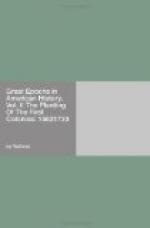In connection with the above scheme, Las Casas, unfortunately for his reputation in after-ages, added another provision, namely, that each Spanish resident in the island should have license to import a dozen negro slaves. The origin of this suggestion was, as he informs us, that the colonists had told him that, if license were given them to import a dozen negro slaves each, they, the colonists, would then set free the Indians. And so, recollecting that statement of the colonists, he added this provision. Las Casas, writing his history in his old age, thus frankly owns his error:
“This advice, that license should be given to bring negro slaves to these lands, the cleriqo Casas first gave, not considering the injustice with which the Portuguese take them and make them slaves; which advice, after he had apprehended the nature of the thing, he would not have given for all he had in the world. For he always held that they had been made slaves unjustly and tyrannically; for the same reason holds good of them as of the Indians.”
The above confession is delicately and truthfully worded—“not considering”; he does not say, not being aware of; but though it was a matter known to him, his moral sense was not watchful, as it were, about it. We must be careful not to press the admissions of a generous mind too far, or to exaggerate the importance of the suggestion of Las Casas. It would be quite erroneous to look upon this suggestion as being the introduction of negro slavery. From the earliest times of the discovery of America, negroes had been sent there. But what is of more significance, and what it is strange that Las Casas was not aware of, or did not mention, the Hieronymite Fathers had also come to the conclusion that negroes must be introduced into the West Indies. Writing in January, 1518, when the fathers could not have known what was passing in Spain in relation to this subject, they recommended licenses to be given to the inhabitants of Espanola, or to other persons, to bring negroes there. From the tenor of their letter it appears that they had before recommended the same thing. Zuazo, the judge of residencia, and the legal colleague of Las Casas, wrote to the




